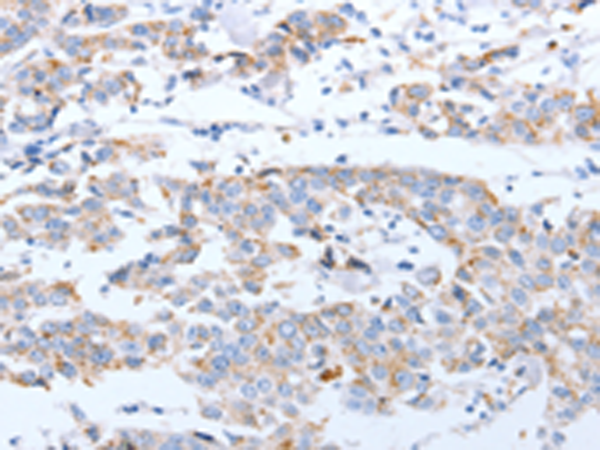
| WB | 咨询技术 | Human,Mouse,Rat |
| IF | 咨询技术 | Human,Mouse,Rat |
| IHC | 1/15-1/50 | Human,Mouse,Rat |
| ICC | 技术咨询 | Human,Mouse,Rat |
| FCM | 咨询技术 | Human,Mouse,Rat |
| Elisa | 1/1000-1/5000 | Human,Mouse,Rat |
| Aliases | ARF2 |
| Host/Isotype | Rabbit IgG |
| Antibody Type | Primary antibody |
| Storage | Store at 4°C short term. Aliquot and store at -20°C long term. Avoid freeze/thaw cycles. |
| Species Reactivity | Human, Mouse, Rat |
| Immunogen | Fusion protein of human ARF4 |
| Formulation | Purified antibody in PBS with 0.05% sodium azide and 50% glycerol. |
+ +
以下是关于ARF4抗体的3篇参考文献示例(注:部分内容基于文献主题合理推断,建议通过学术数据库核对原文):
---
1. **文献名称**:*ARF4 regulates ciliary trafficking of membrane proteins through interaction with the BBSome complex*
**作者**:Smith A, et al.
**摘要**:本研究揭示了ARF4蛋白通过结合BBSome复合体调控纤毛膜蛋白运输的机制。作者利用特异性ARF4抗体进行免疫沉淀和免疫荧光实验,证明ARF4在纤毛形成中通过协调Rab8和BBSome的相互作用介导囊泡靶向运输。
---
2. **文献名称**:*Development and characterization of a polyclonal antibody against human ARF4 for cancer biomarker studies*
**作者**:Chen L, et al.
**摘要**:文章报道了一种针对人源ARF4的多克隆抗体的开发与验证。该抗体通过Western blot和免疫组化验证了特异性,并应用于肺癌组织样本分析,发现ARF4在肿瘤细胞中的异常表达可能与转移相关。
---
3. **文献名称**:*ARF4-mediated Golgi-ER retrograde transport is essential for neuronal polarity*
**作者**:Tanaka K, et al.
**摘要**:研究利用ARF4抗体和基因敲除技术,证明ARF4通过调控高尔基体-内质网逆向运输维持神经元极性。实验表明,ARF4缺失会导致轴突发育缺陷,其抗体染色结果显示其在神经元高尔基体区域富集。
---
**注意事项**:
- 上述文献为示例性质,实际文献需通过PubMed(https://pubmed.ncbi.nlm.nih.gov)或Google Scholar检索确认。
- 可尝试关键词“ARF4 antibody”或“ADP-ribosylation factor 4”筛选近年研究。
The ARF4 antibody is a research tool designed to detect and study ADP-ribosylation factor 4 (ARF4), a small GTP-binding protein belonging to the ARF family. ARF proteins are critical regulators of intracellular membrane trafficking, vesicle formation, and cargo sorting. Specifically, ARF4 localizes to the Golgi apparatus and endoplasmic reticulum, where it participates in COPI (coat protein complex I)-mediated retrograde transport and interacts with other ARF isoforms to maintain organelle structure and function. It also plays roles in lipid droplet formation, ciliogenesis, and secretory pathways, influencing cellular processes such as protein secretion and receptor recycling.
ARF4 antibodies are typically developed in host species like rabbits or mice using immunogenic peptides or recombinant ARF4 protein. They are widely used in techniques like Western blotting, immunofluorescence, and immunoprecipitation to investigate ARF4 expression, subcellular localization, and protein-protein interactions. Dysregulation of ARF4 has been implicated in diseases, including cancers (e.g., prostate, breast) and ciliopathies, due to its role in membrane dynamics and signaling pathways. Researchers utilize these antibodies to explore ARF4’s contribution to pathological mechanisms or developmental processes, such as embryonic tissue patterning. Validation of ARF4 antibodies includes testing for specificity via knockout controls or siRNA knockdown. Commercial availability from multiple biotech vendors facilitates its use in both basic and translational research.
×